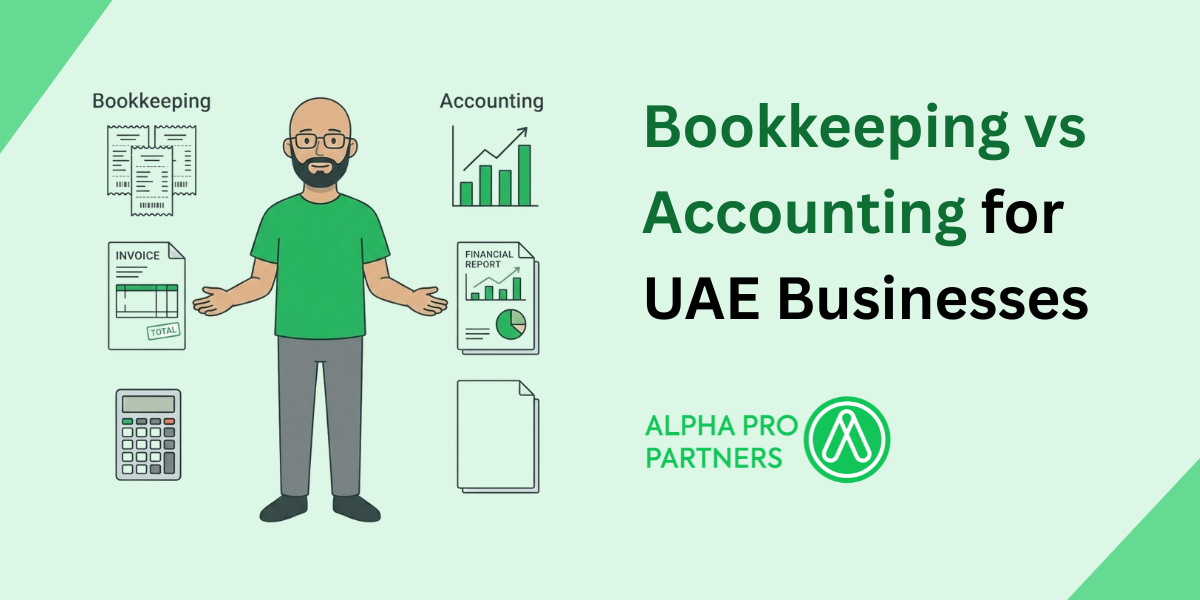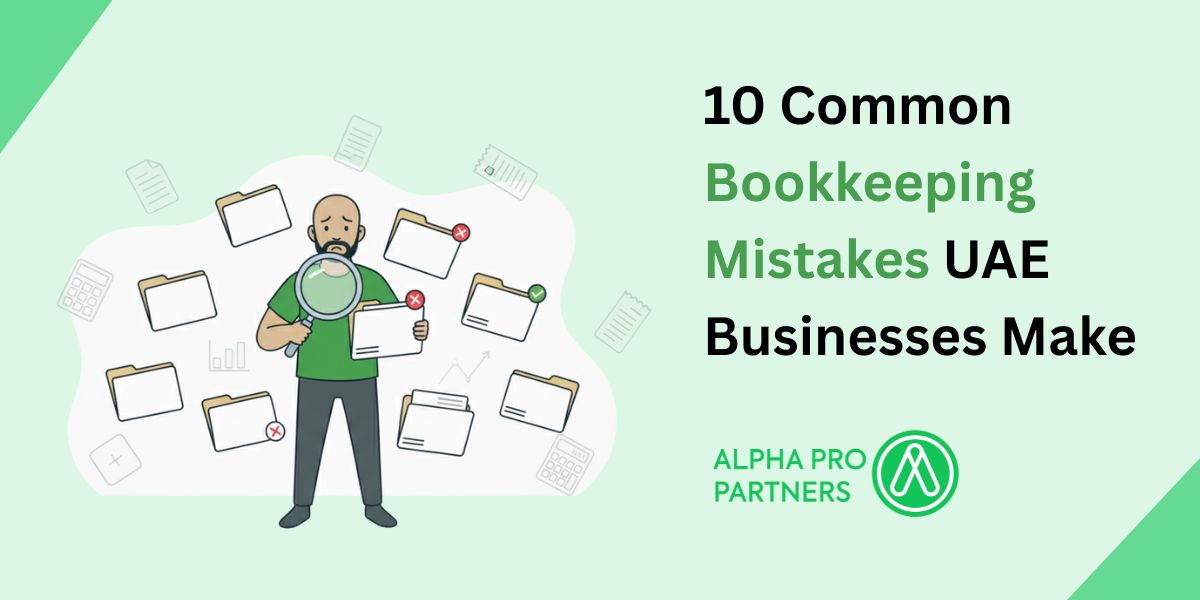Corporate Tax in the UAE: What It Means for Freelancers and Individuals

Corporate tax in the UAE is no longer just for multinational companies. The law also applies to individuals who are actively running a business. That means freelancers, trade license holders, and even people with side hustles may now be required to register once their earnings pass a certain threshold.
At Alpha Pro Partners, we’ve seen confusion among individuals who assume the law doesn’t affect them. The truth is, if you generate consistent business income, you may already be under scope.
How the UAE Corporate Tax Law Extends to Individuals
The UAE’s Federal Decree-Law No. 47 of 2022 clearly states that natural persons earning from business activity are subject to corporate tax. It doesn’t matter if the business is large or small, online or offline, what matters is the level of revenue generated.
So, individuals working independently or offering services must keep track of their yearly revenue. Crossing the threshold means corporate tax registration is mandatory.
Which Individuals Fall Under the “Natural Person” Definition?
The law uses the term “natural person” to describe individuals who earn directly from business activities under their own name. This covers a wide variety of people in today’s economy, such as:
- Freelancers in fields like marketing, design, or IT services.
- Self-employed coaches and consultants.
- Single-license holders with no company structure.
- Online sellers and e-commerce operators.
- Landlords generating business-like commercial rental income.
- Creators monetising digital products, courses, or paid content.
- Service providers offering event planning, repairs, or photography.
This group does not include salaried employees or individuals whose earnings come solely from investments. The distinction lies in whether the income is tied to ongoing business activity.
The Revenue Threshold That Triggers Corporate Tax
The rule is simple: once a natural person earns over AED 1 million in gross revenue within a tax year, they must register.
Key points to note:
- The threshold is based on total revenue before expenses, not profit.
- Even if your profit is small, crossing AED 1 million in gross income means you are taxable.
Example: A consultant invoices AED 1.1 million in a year but after costs only keeps AED 120,000. They still need to register, as the threshold is based on total revenue.
Income Streams That Can Be Subject to Corporate Tax
If your earnings come from business activity, they are within scope. Taxable income may include:
- Freelance project payments.
- Commissions from sales or brokerage.
- Income from selling goods or services.
- Advisory, training, or coaching fees.
- Online course sales, digital content, or subscriptions.
- Revenue from a sole trade or professional license.
Tax applies once gross revenue passes AED 1 million, with the first AED 375,000 of profit exempt and anything above taxed at 9%.
Personal Income Sources Excluded from Corporate Tax
Some types of earnings are not taxable under the corporate tax law. These include:
- Salaries from employment.
- Savings account interest.
- Dividends or gains from personal investments.
- Residential rental income treated as personal rather than business.
- Occasional or one-off income that doesn’t resemble business activity.
The law is aimed at consistent, profit-driven operations rather than casual or passive income streams.
Crossing the AED 1 Million Mark: What Comes Next
Once revenue goes beyond AED 1 million in a financial year, an individual must:
- Register with the Federal Tax Authority (FTA).
- Receive a corporate tax registration number.
- Keep proper financial statements.
- File an annual return.
- Maintain business records for at least seven years.
The tax calculation is straightforward:
- 0% on the first AED 375,000 of profit.
- 9% on profit above that level.
Failure to register can lead to fines of AED 10,000 for late registration, even if no tax is ultimately due.
Small Business Relief Options for Individuals
The UAE introduced Small Business Relief to ease the pressure on smaller operators. Individuals may claim this if:
- They are UAE tax residents.
- Their business revenue does not exceed AED 3 million.
- They are not part of a multinational group.
- They are not already benefiting from Free Zone 0% tax status.
With relief applied, taxable income is treated as zero. However, the return still needs to be filed to confirm eligibility.
This measure is valid from 1 June 2023 until 31 December 2026, unless the government extends it.
Bookkeeping and Record-Keeping Duties for Individuals
Good records are a must. Every registered individual must:
- Track all income and expenses.
- Follow accrual accounting, recognising income when earned.
- Prepare yearly financial statements.
- Retain invoices, receipts, and contracts for at least seven years.
In rare cases, very small businesses may apply for cash accounting, but this requires approval from the FTA.
Example Scenarios of Individuals Under Corporate Tax
Scenario 1: The Consultant
Amina, a freelance HR consultant, earns AED 1.2 million annually. She must register, prepare accounts, and file her corporate tax return.
Scenario 2: The Investor
Khalid earns AED 850,000 from dividends and stock sales. Since this is investment income, not business activity, he does not need to register.
Scenario 3: The Online Seller
Noura runs a small e-commerce shop. Her sales crossed AED 1.1 million this year. She now needs to register with the FTA and comply with corporate tax rules.
Scenario 4: The Dual Earner
Bilal makes AED 950,000 from freelance photography and AED 150,000 from a part-time teaching job. Only his freelance revenue counts toward the threshold. Since it’s under AED 1 million, he is not yet required to register.
Scenario 5: The Unexpected Growth
Lina launched an online language course platform. Her income surged to AED 1.3 million in the first year. She must register despite the business being new and still managing costs.
Situations Where Individuals Are Exempt from Corporate Tax
Individuals do not need to register if:
- Business revenue stays under AED 1 million a year.
- They only earn from salaries, savings, or personal investments.
- They qualify for Small Business Relief and claim it correctly.
But once business income grows past the threshold, registration is no longer optional.
Steps to Take Now if You Earn Business Income
If you are unsure whether corporate tax applies, take these steps:
- Review your past 12 months of revenue.
- Identify which income sources are business-related.
- Register with the FTA if you cross AED 1 million.
- Keep financial records updated and accurate.
- File your return on time to avoid penalties.
We recommend individuals don’t wait until the last minute. Early action avoids fines and keeps your business activities on the right side of compliance.
Conclusion: Don’t Overlook Your Tax Duties
Corporate tax in the UAE applies to more than just big businesses. Individuals running profitable operations must now register once their revenue goes beyond AED 1 million. That includes freelancers, consultants, online sellers, and other professionals.
With proper planning, the system is straightforward: the first AED 375,000 of profit is exempt, and anything above is taxed at 9%. Relief is also available for smaller businesses.
Contact Alpha Pro Partners today for a free consutlation to find out if you need to register for corporate tax.
FAQ: Corporate Tax for Individuals in the UAE
1. Do freelancers need to register for corporate tax?
Yes, if they earn more than AED 1 million in annual business revenue.
2. Is the AED 1 million threshold based on profit or revenue?
It is based on total revenue before expenses, not profit.
3. Do dividends and capital gains count as taxable income?
No. Personal investment income such as dividends and capital gains is excluded.
4. Does residential rent make me taxable?
No, unless it is treated as a business activity such as commercial rentals.
5. Can individuals apply for Small Business Relief?
Yes, if their revenue is AED 3 million or less and other conditions are met.
6. Do I still need to file if I qualify for Small Business Relief?
Yes. Filing is required to show eligibility.
7. Can I use cash accounting instead of accrual?
Only in limited cases with FTA approval. Most must use accrual.
8. What happens if I don’t register on time?
You may face a fine of AED 10,000 for late registration.
9. Do part-time side hustles count?
Yes, if combined revenue exceeds AED 1 million a year.
10. How can Alpha Pro Partners help me?
We assist individuals with registration, compliance, accounting, and tax filing.

.webp)







%20Widgets%2C%20Shortcuts%20%26%20Customisation.jpg)







.webp)
.webp)


.png)
.png)
.png)
.png)
.png)

.png)
.png)



.png)
.png)





.jpg)


.jpg)





.png)
.png)






.png)


